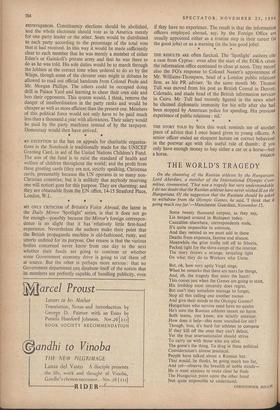THE WORLD'S TRAGEDY
On the shunning of the Russian athletes by the Hungarians, Lord Aberdare, a member of the International Olympic Colnn mittee, commented, 'That was a tragedy but very understandable. 1 do not doubt that the Russian athletes have never wished ill on the Hungarians. Of the suggestion that the Russians should be asked to withdraw from the Olympic Games, he said, '1 think that going much too far.'—Manchester Guardian, November 15.
Some twenty thousand corpses, as they say, Lie heaped around in Budapest today. Casualties elsewhere, correspondents state, It's quite impossible to estimate,
And they remind us we must add to these Deaths from exposure, famine and disease. Meanwhile the grim trains roll off to Siberia, Packed tight for the slave-camps of the interior. The story throws a strange, revealing light On what they do to Workers who Unite.
But, oh, how very aptly Virgil sings, When he remarks that there are tears for things, And, oh, the tragedy that sears the heart! This comes just when the Games are going to start. His lordship most sincerely does regret, But can't they somehow manage to forget, Stop all this calling one another names And give their minds to the Olympic Games? Hungarians who survive need have no qualm He's sure the Russian athletes meant no harm. Both teams, you know, are strictly amateur. How does it help—this most uncalled-for stir? Though, true, it's hard for athletes to compete If they kill off the ones they can't defeat, Yet the true internationalist should strive To carry on with those who are alive.
The game's the thing. To drag in these political Consideration's almost jesuitical.
People have talked about a Russian bar. That would, he thinks, be going much too far, And yet—observe the breadth of noble minds— He is most anxious to make clear he finds The Hungarian point upon the other hand Not quite impossible to understand.
CHRISTOPHER HMO










































































 Previous page
Previous page